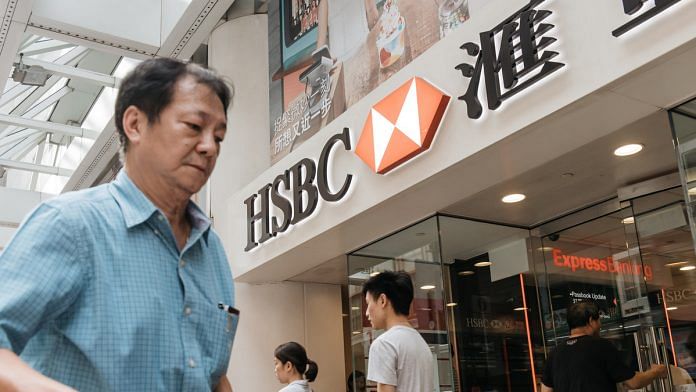The good times for HSBC may be ending in Hong Kong.
Watch out HSBC Holdings Plc. The digital banking revolution is coming for all the easy money the U.K.-based bank has long taken for granted.
Hong Kong was HSBC’s birthplace as the Hongkong & Shanghai Banking Corp., and the former British colony remains its single biggest market, a source of sticky deposits and ready borrowers.
Not for long, though: The offshore Chinese city is opening its doors to app-based banks that will offer a faster, livelier consumer experience without the red tape of a giant financial institution. The Hong Kong Monetary Authority, the de facto central bank, says it’s received 29 applications for a first batch of licenses, with traditional players like HSBC’s rival, Standard Chartered Plc, vying with fintech providers such as WeLab Ltd. for the business of digitally savvy millennials.
It may take a while for HSBC to lose its consumer dominance, but the bank will feel early pain from the digital upstarts: Retail banking in the city is twice as profitable as corporate business, according to Goldman Sachs Group Inc. analysts. Hong Kong accounts for an extraordinary 49 percent of HSBC’s pretax profit, while the U.K., where it’s the biggest bank, generates just 18 percent, according to Citigroup Inc. HSBC will report third-quarter earnings Monday.
The disruption couldn’t come at a worse time. HSBC (including its Hang Seng Bank Ltd. unit), Standard Chartered and Bank of China Ltd.’s offshore arm, BOC Hong Kong Holdings Ltd., have a stranglehold on the city’s banking market — together, the three institutions control 66 percent of retail lending, 77 percent of the mortgage market and 76 percent of the credit card business, according to Goldman Sachs. They hold as much as half of all deposits.
But the good times are ending. China’s big banks have been opening subsidiaries apace, eroding the market dominance of HSBC and StanChart. Chinese companies, a key borrowing base for the city’s banks, are finding that the falling yuan is making offshore borrowing a lot more expensive. Already, deposit and loan growth has slowed this year.
HSBC has developed its own payments app and boosted its digital presence, so there’s no immediate risk of a mass exodus of salary earners and savers to startups.
The online-only banks face limitations, too: While they’re free from the overheads of physical branches, they must attract depositors with high interest rates and lower loan charges, limiting their ability to make money. Their only sure way to profit may be cross-selling products like insurance. Without the cheap funding provided by a large deposit base, some may struggle, and consolidation is inevitable. Winning customers is expensive: Look at Britain’s two-year-old Atom Bank Plc: Assets tripled in its last fiscal year, but losses are surging.
For all that, HSBC and the rest of Hong Kong’s old guard will have to face the competition by cutting some fees or raising ultra-low deposit rates to limit defections. As the U.S. trade war hurts HSBC’s vital China market and Brexit hangs over its U.K. base, the bank can’t afford to be complacent.-Bloomberg



